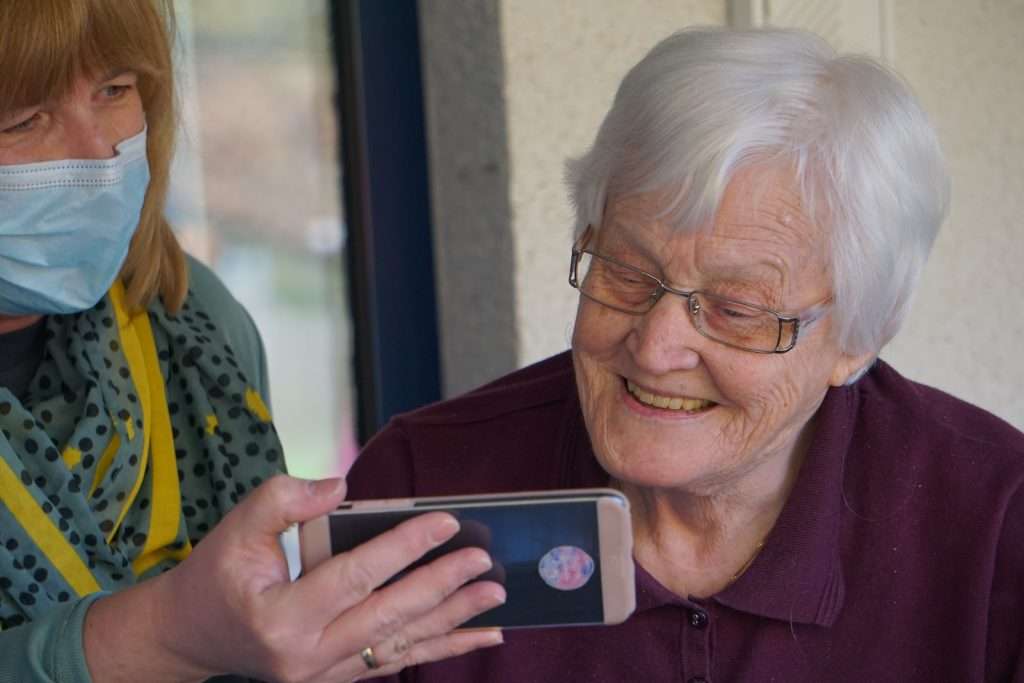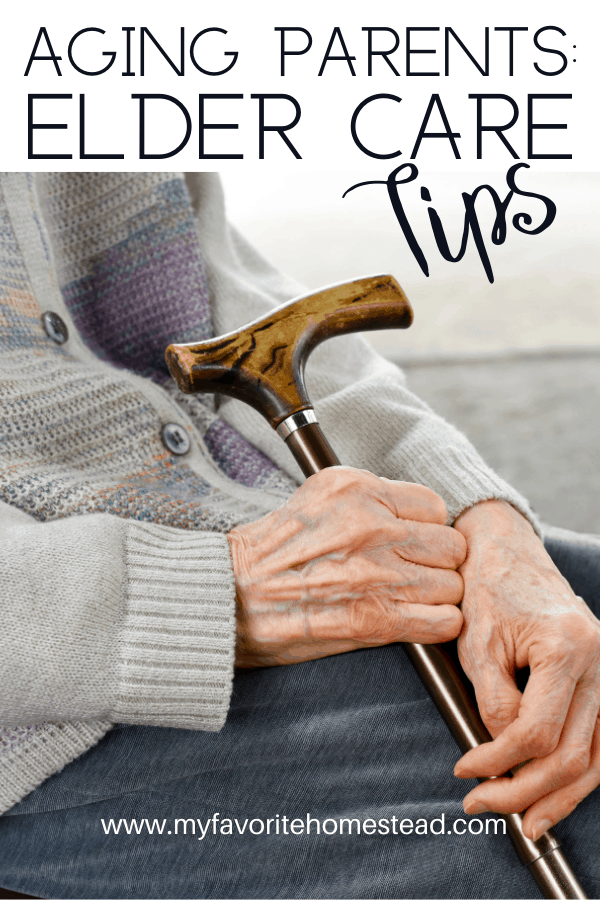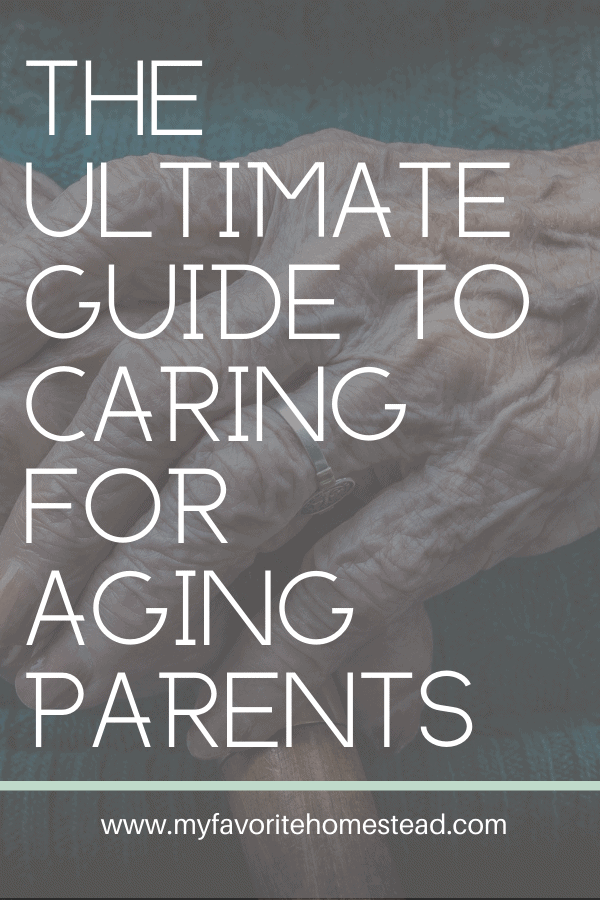The Ultimate Guide to Caring for Aging Parents
Caring for aging parents is becoming increasingly relevant in this day and age of longer life. Gone are the days of shorter life spans due to the miracles of modern medicine. While this is a blessing, it comes along with its own challenges.

Why do I care about this topic? I’ve seen countless adult children struggling with this very issue. As an Occupational Therapy Assistant working in home health and skilled nursing facilities for the past decade, I’ve found some tips and ideas for caring for aging parents that will hopefully help you in this phase of life. Becoming a caregiver for your aging parent is a whole different dynamic and both adult children and parents have to transition with role reversal.
How to Take Care of Elderly Parents at Home


Caring for elderly parents at home can be a challenge but is something that is totally do-able with the right support.
Some common misconceptions I’ve seen people have is that if their parents need help in one aspect, they must need help with everything. When adult children have this mindset, they end up unknowingly taking away a lot of independence from their parent and then from NOT doing things for themselves, the parent ends up losing the skill. AND the caregiver gets burnout.
On the flip side, some children are so close to the situation that they fail to recognize signs of their parent’s cognitive or physical declines which poses a safety issue for them remaining independent at home.
Another misconception is that your parents (or parent) need to be a) completely independent at home, b)must move in with you, or c) go to a skilled nursing facility.
There are many things you can do to care for your aging parents to keep them safe at home and as independent as possible without them having to move from their home.
How to Deal with the Stress of Caring for an Elderly Parent


What Causes Stress as a Caregiver
Allowing yourself to be “on call” 24/7 is a huge reason for caregiver stress. Learn to delegate and let go in order to combat this particular stressor.
Financial difficulties stemming from the caregiver reducing work hours or quitting work altogether to care for their parents. If not reducing work hours, the cost of paying others to care for their parents. Work with a financial advisor to help you navigate these waters.
Isolation is another stressor. Often caregivers spend all their time caring for their aging parents rather than socializing with friends and other members of the family. Take time to keep your other relationships strong.
Read 5 Tips to Care for Yourself
How to Deal with Difficult Elderly Parents
Try to understand where they are coming from. If it’s an irrational thought or request due to dementia or some other cognitive issue, don’t argue. Try to re-direct to something else.
Pick your battles. For instance, if you want them to take a shower and they don’t want to right now, let it go. Offer to just help with a sponge bath or just use the term get “cleaned up.” If they make a habit of not showering or washing, there are other strategies you may need to try.
Blame it on someone else. Such as “the doctor said you have to” or “the therapist said to do this.” I never mind being the “bad guy” if it helps get the best outcome for the patient!
You might also like: Inexpensive gifts for senior citizens
What to do When Siblings Won’t Help with Elderly Parents
Working in home health, I’ve seen it all. Sometimes siblings work great together and rely on each one’s strengths and try to divide work evenly. Then there’s the other half; one child does all of the work and becomes resentful that the other siblings won’t help.
Sometimes it’s a matter of proximity and the distant siblings truly aren’t aware of their aging parents’ decline. Or there is one that just has always had a closer relationship with their parents.
Either way, remember that the other siblings aren’t mind readers. Be direct and specific with the type of help you need. Try to match the needs with the strengths of the other siblings.
The ones who are distant may feel helpless, but they can call and make doctor appointments just like someone closer and call to arrange transportation, etc. They can care for finances from a distance if that’s not an issue.
The ones who are close can do grocery shopping, taking to doctor appointments, take turns staying with them, etc. If you’re the caregiver and you don’t work outside the home, but your siblings do, they can still be in the rotation to stay with your parents while you get much-needed breaks. YOU have to be direct in what the need is.
Most importantly, if you can’t work this out on your own, seek a professional to help you all negotiate a fair system to keep your sibling relationships intact and your aging parent(s) cared for.
How to Get Paid for Caring for Aging Parents


Social Security
As I understand this, social security does NOT cover paying a caregiver. However, certain states have Medicaid benefits which will pay someone to be a caregiver. Contact your local senior services to find out what is required to qualify.
What States Pay Family Caregivers
The states that pay family caregivers varies wildly! Contact your state’s Medicaid office to find out what options are available. The name of your state’s Medicaid office varies wildly too. A local senior agency or a social worker at your local hospital should be able to point you in the right direction.
Other Options for Getting Paid
Some other options for getting paid to care for aging parents are to ask your family to pay you. If they were to pay a homemaker for care, there is no reason why you couldn’t be compensated for this service.
Another option is to have your parents pay you if they have the resources.
I know that these are trickier options, but still viable.
If they are a veteran, they may qualify for caregiver pay.
Some insurance policies have long-term care benefits that also include paying a caregiver. It depends on the type of insurance and their terms.
Help the Elderly in Your Family


Organize Doctor Visits
Whether you’re the planner to make the doctor appointments, the driver to the doctor appointments, or the person picking up prescriptions, these are all aspects of this process that can be delegated to other family members, friends or paid caregivers.
It does help to have one person in charge of coordinating all of this. This is a great job for the person who lives away to plan and coordinate as most of this can be done over the phone or online.
Pick Up Groceries
Getting groceries is necessary and is a great way to help the main caregiver out or just to help your parents take care of this one job. Lifting heavy items in and out of the shopping cart, loading and unloading them is sometimes a difficult job that you can help with.
Protect Against Scams
Protect your aging parents against common scams such as paying to get their grandchildren out of jail, the bank calls and needs all their personal info, electric company calls and says they will get their power shut off if they don’t give their credit card info or bank info and the list goes on.
One patient’s home I was in called and threatened to sue that individual for not paying a bill if they didn’t give their bank info. The individual had memory issues and was looking for the checkbook to give them that info. Thankfully, the son had all of the financial info and that individual couldn’t find it to give it to them.
Of course I notified the son of the attempt to scam their parent. So it does happen, help your parents be aware. Establish a code word if able so they know who they can trust.
Common Questions/FAQ About Caring for Aging Parents


- Who is more likely to care for aging parents
- Women are much more likely than men to be the primary caregiver.
- Why should we take care of our elderly parents?
- Seniors deserve to have their basic needs met. If you had great parents the reasons are many. They love you and have sacrificed for you! If they weren’t that way for you, they still need to be cared for as they age whether it’s by you or a qualified facility.
- How do I get paid to care for my elderly parent or spouse?
- It varies from state to state and country to country. Check your local resources for more information.
- Can I leave my elderly parent home alone?
- It depends. Look for cognition signs as well as physical signs that they can be safe at home alone. When in doubt, get the opinion of the professionals.
- How can I make my home senior friendly?
- Keep pathways clear. Make sure the bathroom is accessible for them. Make sure there is a seat they can sit in that they can get up and down from. Ensure they can safely enter your home.
- How do I care for an aging parent who resists help?
- Enlist the help of the physician. Pick your battles. Bring in other help if needed. Sometimes an outside person is all it takes to get more cooperation.
The Last Thing You Need to Know about Caring for Aging Parents
Caring for aging parents is rewarding and challenging. Take care of the stress that comes with it. Enlist help from other family members, friends, and your local church. Check into local resources for helping with the financial burden.
If you liked this post, please share!

PLAN YOUR LIFE LIKE A BOSS!

GET YOUR FREE PLANNER PRINTABLES TODAY!
- Use these free planner printables to take control of your life.
- Includes budget, meal, and project planner inserts.
- Undated to use over and over again!
Sign up to get your planner today!








